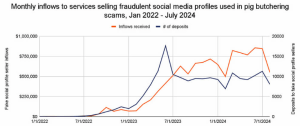Cybercriminals involved in cryptocurrency are increasingly turning to “pig butchering” scams instead of the longer-running Ponzi schemes, as law enforcement gets better at shutting down these elaborate scams.
In the latest crypto crime update published on August 29, blockchain security firm Chainalysis reported a significant rise in pig butchering scams in 2024. The report highlights how crypto scammers are changing their tactics, both online and offline, to carry out more destructive scams in a shorter amount of time.
The average lifespan of crypto scams has dropped dramatically, from 271 days for scams that started in 2020 to just 42 days for those that began in 2024. Eric Jardine, the cybercrimes research lead at Chainalysis, explained to Cointelegraph that this decline shows how effective law enforcement has become.
“These interventions have forced scammers to quickly change their operations, making them harder to track on the blockchain. However, harder to track doesn’t mean impossible, and law enforcement’s success in tracking and recovering assets is promising,” Jardine said.
Additionally, 43% of scam-related crypto inflows this year have gone to wallets that became active in 2024, indicating a surge in new scams, many of which are pig butchering schemes. The report notes, “This trend shows that scammers are shifting from complex Ponzi schemes to more targeted attacks like pig butchering.”

Pig butchering is a tactic where scammers build an online relationship with a victim, “fattening them up” with trust before convincing them to invest in a fake crypto project, leading to a financial loss when the scammer pulls out.
Chainalysis points out that this shift is partly due to increased law enforcement efforts and stablecoin issuers blacklisting scam-related addresses. One of the biggest scam wallets in 2024 is linked to Myanmar’s KK Park, a notorious pig butchering operation that has raked in over $100 million so far this year.
Scammers are also buying pre-established social media profiles from platforms like Facebook, Tinder, and Match.com through China-based services to use in their pig butchering campaigns. Illicit services selling these accounts have seen more than $10 million in crypto flow through them over the past two years, and up to two million social media profiles may have been bought by scammers to target victims.
Eric Jardine noted that these scams often exploit personal relationships, making certain groups more vulnerable. “Those most likely to form these online relationships, like the elderly, people going through life changes, and those seeking friendship or romance, are often the most susceptible,” he added.
One illicit marketplace mentioned in the report is Huione Guarantee, which has handled more than $49 billion in cryptocurrency transactions since 2021. This platform facilitates various illegal activities, including pig butchering, investment fraud, and money laundering, by connecting buyers and sellers on messaging platforms like Telegram.
Source: https://cointelegraph.com/news/crypto-scammers-pivot-pig-butchering-chainalysis
_________________
Disclaimer: “The articles on this website reflect the opinions of the respective writers and are not the opinion of Museigen.io. In addition, nothing in this article should be considered as financial advice. It is essential to conduct your independent research and consult with a qualified financial advisor before making any financial decisions.”


